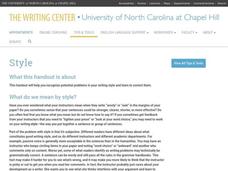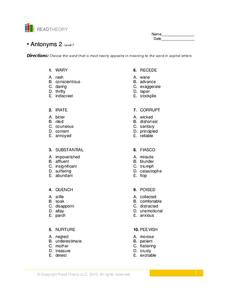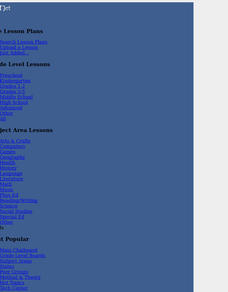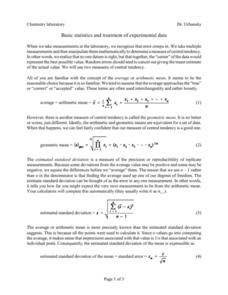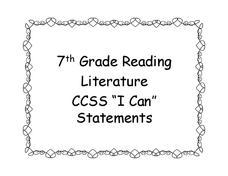University of North Carolina
Style
Just like you choose your clothes to ensure they fit the occasion, you should choose your words deliberately while writing. Style, the main topic of one handout in a series on writing skills, involves choosing words carefully and paying...
Curated OER
Poetic Elements
Poetry is all about sound and rhythm. The sound of the words, the rhythm of the lines, and the emotional atmosphere created by these elements and the literary devices poets use, compress whole stories into a few stanzas. The specialized...
Curated OER
Resources
Students are introduced to different context clues. In this context clues lesson, students analyze sentences to find the meaning of a word using context clues.
Utah Education Network (UEN)
8th Grade Poetry: Sonnet Poem
The third lesson of five in an eighth-grade poetry unit has young scholars comparing Shakespearean sonnets with Petrarchan sonnets. To begin, they examine the different structures of the two forms and their different rhyme schemes. After...
Curated OER
Antonyms 2
Explore 10 different antonyms with this vocabulary development worksheet. High schoolers explore words like amnesty, charity, and motley. The answer key is particularly helpful, as each word option is defined.
Curated OER
Propaganda
How does word choice affect the reading of a text? Compare two headlines that were written about the same event. Is one biased? Discuss how word choice often reveals the author's feelings about a topic. Then look at different techniques...
Curated OER
Day 1 - Synonyms
Looking for a good presentation on synonyms? This presentation could be for you! After basic instruction on synonyms, pupils are given many opportunities to practice using them in a variety of ways. Additionally, they learn how to use a...
Curated OER
Synonyms
Use this resource to help learners improve the quality of their writing. Discuss the importance of using synonyms for commonly used words. Class members also learn to use a thesaurus, and revise a writing sample to include more...
Curated OER
Antonyms 5
Develop vocabulary in your pupils. This multiple-choice resource could be used for both native and non-native English speakers. Ten vocabulary words are presented, and learners must identify their antonyms. Example words include...
Curated OER
Antonyms 2
Learing antonyms for different words really deepens one's understanding of the vocabulary at hand. Use this resource to assess your learners knowledge of words like wary, recede, peevish, and nurture.
Curated OER
Idioms
Use this podcast lesson plan to familiarize scholars with the characteristics, history, and cultural implications of idioms. As part of the Walking Classroom curriculum, kids listen to a 12-minute podcast as they walk around campus. If...
Curated OER
Classical Period: Understanding Four-Bar Sequences
Her is an interesting topic, as well as a great way to teach it! You'll find two worksheets on this link, one for the teacher, and one for the learner. Worksheet one describes how classical composers used musical repetition to make their...
Curated OER
Basic Stats
In this chemistry worksheet, students focus upon the concepts of mean and standard deviation and how it is used in the laboratory to interpret data.
Curated OER
A Discourse on the History of Language
Analyze and make inferences from the information used by linguists to construct the evolution of languages. They research different dating techniques to explain how scientists infer age with evidence.
Curated OER
Finders Keepers: Vocabulary Instructional Routine Guide for Extremely Loud and Incredibly Close
Like Oskar, the curious boy in Jonathan Safran Foer’s story, class members journey through other “stories that the mouth can’t tell” to find another sentence that uses a word found in novel. Individuals create their own vocabulary list,...
Curriculum Corner
7th Grade ELA "I Can" Statement Posters
Help your seventh graders relate the ELA Common Core standards to their own learning with these "I Can" statement posters. Each standard has been translated into a statement that pupils can understand and placed on its own page for easy...
Curated OER
Alphabet Poems
Develop fluency with a variety of works. Help kindergartners use multiple strategies to understand text and decoding. They will create an alphabet poem book on Kid Works 2 to illustrate and write their own poem. In the end, they will...
Curated OER
Sentence Patterns II: Locating Objects and Complements
What sets this worksheet apart are the clear, concise explanations for some rather complex grammatical terms. Object complements, subject complements, transitive and intransitive verbs, and direct and indirect objects are all carefully...
University of the Desert
What Is Culture?
Introduce your class to the meaning of culture with this great collection of activities and materials. After reviewing quotes from young adults around the world, learners then construct metaphors describing culture and discuss the...
Curated OER
Quick and Sticky Context Clues
Discuss strategies for defining word your young readers don't know. They read sentences with key words covered by sticky notes and guess from the context what the word might be. They peek at the first letter and guess again.
Curated OER
Nouns in a Story
Students, assessing a variety of formatting tools with Microsoft Word, utilize a bank of vocabulary words to make a personal dictionary of nouns. They classify nouns for people, places, things and ideas and separate them into common and...
Ellsworth American
Think About the Newspaper
Investigate the significance of adjectives with a newspaper activity that addresses effective language. Readers probe teacher-provided articles in search of the mighty modifiers, and practice by replacing them with a different word, and...
Curated OER
Improving Sentences 1
Explore editing and revising writing with this presentation. Learners discuss ways to improve a sentence. They discuss how to revise a sentence by adding adjectives, descriptive verbs, and more. While the presentation itself isn't...
K12 Reader
Evaluating in Math
Help kids understand problem-solving strategies by focusing on academic language in a reading comprehension activity. After reading paragraphs about the words solve and evaluate, learners answer five reading comprehension questions.


